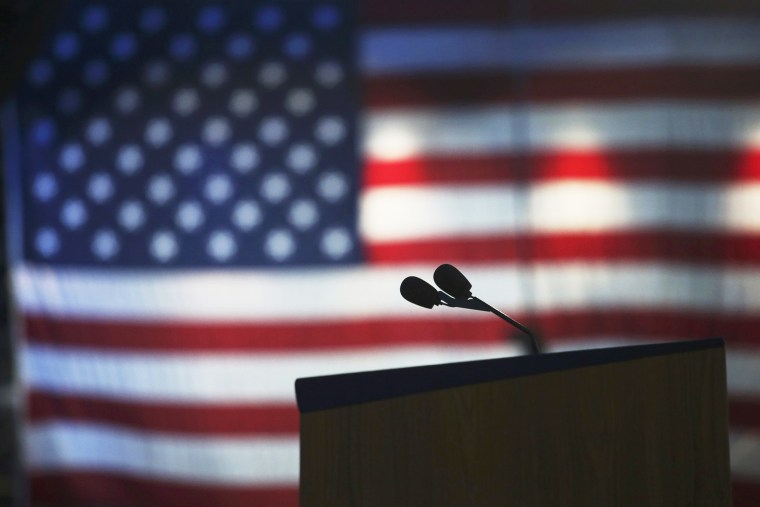Ahead of the 2004 presidential election, Democratic voters had a sizable field of White House hopefuls to choose from, but after a few debates, many in the party started asking, "Is there anybody else?" The appetite for a new option led retired Gen. Wesley Clark to jump into the race in September 2003.
Ahead of the 2008 presidential election, Republican voters had a sizable field of White House hopefuls to choose from, but after a few debates, many in the party started asking, "Is there anybody else?" The appetite for a new option led retired Sen. Fred Thompson to jump into the race in September 2007.
Ahead of the 2012 presidential election, Republican voters had another sizable field of White House hopefuls to choose from, but after a few debates, many in the party started asking, "Is there anybody else?" The appetite for a new option led Texas Gov. Rick Perry to jump into the race in August 2011.
And as a New York Times report noted today, "It's that time of the election season for Democrats."
"Since the last debate, just anecdotally, I've had five or six people ask me: 'Is there anybody else?'" said Leah Daughtry, a longtime Democrat who has run two of the party's recent conventions.With doubts rising about former Vice President Joseph R. Biden's ability to finance a multistate primary campaign, persistent questions about Senator Elizabeth Warren's viability in the general election and skepticism that Mayor Pete Buttigieg, of South Bend, Ind., can broaden his appeal beyond white voters, Democratic leaders are engaging in a familiar rite: fretting about who is in the race and longing for a white knight to enter the contest at the last minute.
The Times' article referenced a variety of possible contenders who could make 11th-hour bids, including former Secretary of State John Kerry and former Attorney General Eric Holder, the latter of whom was described as "considering a last-minute entry."
Former Massachusetts Gov. Deval Patrick said he'd been "nudged by friends to reconsider" his decision not to run, while Ohio Sen. Sherrod Brown, who nearly ran, conceded that "the pressure on him to reconsider from labor leaders, Democratic officials and donors has 'become more frequent.'"
I'm not in a position to say with confidence whether any of these prominent Democrats, or someone else entirely, might yet throw their hat into the ring. Usually, "white knight" candidates have already launched by now, but that doesn't preclude the possibility of someone giving this a shot.
That said, given the circumstances, the fact that this appetite apparently exists in some Democratic circles is ... curious.
For one thing, Democrats have the largest field of presidential candidates since the dawn of the modern American nominating process. Some contenders have dropped out, but it's still the largest field either major party has ever had. It's a diverse group of folks -- it's not as if voters have 19 clones to choose between -- making it tougher to justify the need for someone entirely new.
For another, as the aforementioned "white knight" candidates help prove -- Clark, Thompson, Perry, et al. -- late entrants invariably lose, in part because it's nearly impossible to catch up financially with established candidates.
But even if we put these relevant angles aside, there's a more obvious concern related to the 2020 cycle: Democrats don't necessarily need a "white knight" because -- and this is important -- they're already winning. General election polling currently shows each of the party's top contenders ahead of Donald Trump in 2020 match-ups.
If, hypothetically, the evidence showed each of the leading Democratic candidates trailing Trump by significant margins, it'd be far easier to understand the party looking to the sidelines, wondering who could be brought into the game.
But as things stand, the party doesn't need a solution to a problem that doesn't appear to exist.
